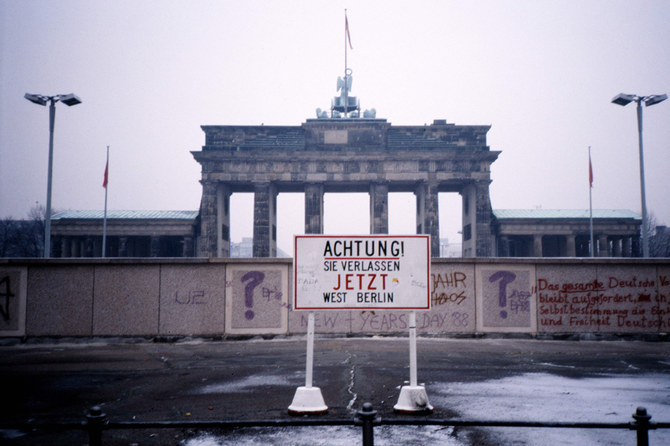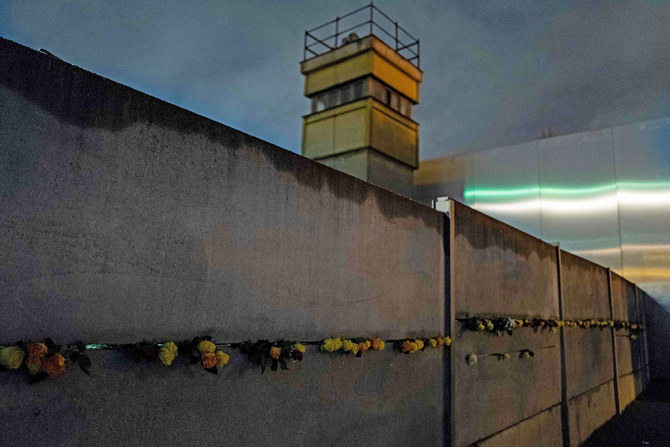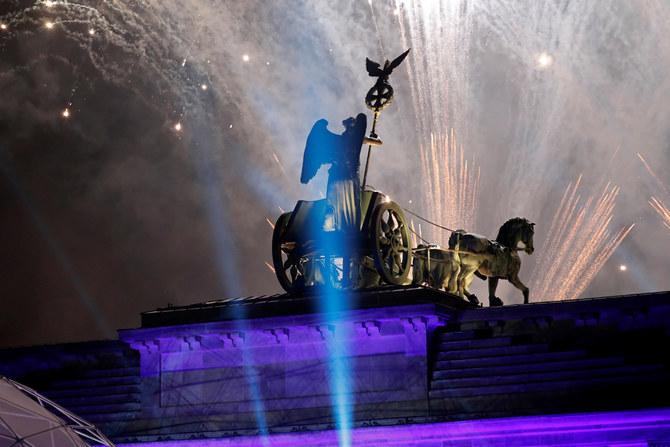DUBAI: Exactly 30 years ago, on the night of Nov. 9, a checkpoint in the most notorious symbol of the Cold War, the Berlin Wall, opened just a little as a result of a confused attempt by East German leaders to blow off pent-up political steam.
The intention was not to open up the border completely. However, the domino effect of that decision on the entire network of checkpoints meant that by midnight jubilant East Germans were perched atop the wall in the heart of Berlin while others attacked the structure with hammers and chisels.
In the days to come, not only did the barrier separating communist East Germany from West Germany crumble both literally and metaphorically, images of the peaceful revolution bounced around the world, planting ideas of liberty and dignity everywhere from Budapest to Baghdad and from Krakow to Khartoum.
In the Arab world, the impact of the events of 1989 was not immediately noticeable even though at the time there were a number of autocratic regimes aligned with the Soviet Union. But as numerous commentators and policy analysts have noted since the outset of the Arab Spring revolts, the significance of the collapse of the Iron Curtain amid a wave of revolutions had not been lost on Arabs.
“The spontaneous, domino-like way in which today’s protests have migrated from one Arab country to another reminds many observers of 1989,” wrote The Atlantic’s Uri Friedman in February 2011. “German Chancellor Angela Merkel – who grew up in East Germany and entered politics in 1989 – claimed that Middle East protesters were ‘shaking off their fear’ just as Eastern Europeans had.”
This week, the 30th anniversary of the event that reshaped the modern world coincides conspicuously with peaceful protests in several Arab countries, notably in Iraq and Lebanon, by millions of people who are fed up with poor public services, corruption, unemployment, interference by neighboring countries and economic mismanagement.
For most of last summer, Sudan and Algeria were buffeted by winds of change. Instead of being content with toppling regime figureheads, the protesters vented their fury at members of the “deep state.” In both countries, the protesters asked for time to organize themselves for elections so that they could compete with established rivals instead of grabbing offers by the regimes of swift elections.
To be sure, the uprisings that have rocked the Middle East since 2011 have all exhibited their unique characteristics. For, as John Simpson, the then World Affairs Editor of BBC News, noted in a 2014 article, “Unlike Europe in 1989, there was no single outmoded political orthodoxy to be overthrown (in the Arab countries.)”
Also, the circumstances in the Middle East and North Africa were – and continue to be — very different from those that existed in the Soviet bloc countries — Hungary, East Germany, Czechoslovakia, Bulgaria and Romania - where Communist dictatorships fell like ninepins after 1989.
The Soviet Union itself was plagued by economic problems and food shortages in the 1980s. In April 1986 the Chernobyl power station in Ukraine became the site of the worst disaster in the history of nuclear-power generation. To long-time critics of communism, the accident signified the dysfunctional state of a crumbling “evil empire.”
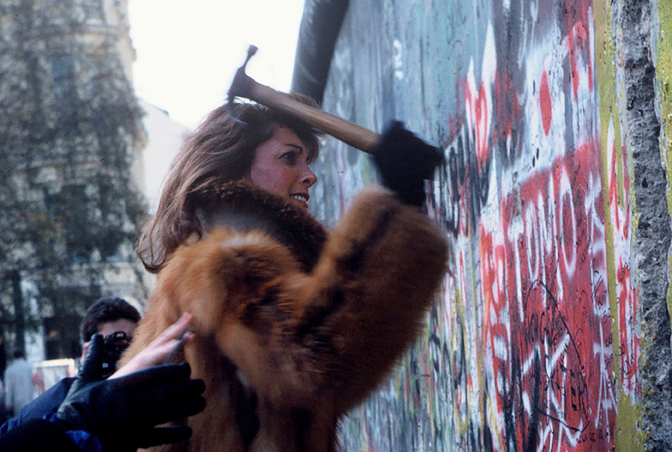
Picture taken in November 1989 shows a wall-pecker trying to tear down remains of the Berlin Wall in Berlin. (AFP)
Elsewhere, reform movements had been cropping up. Bruising strikes in Poland compelled the ruling Communist party to legalize the banned Solidarity trade union. Partially free elections in the summer of 1989 saw Solidarity make big gains in parliament.
Meanwhile, Hungarians were staging mass rallies for democracy, and in May, barbed wire was dismantled along 240km of the border with Austria. In August, 2 million people in the Soviet Union’s Baltic republics — Estonia, Latvia and Lithuania — formed a 600km human chain to press their demands for independence.
For their part, East Germany’s leaders, seeking to loosen the borders just a little, had made travel to Czechoslovakia easier for their people. But this led to dramatic scenes at the West Germany embassy in Prague as droves of East Germans made full use of the opportunity.
Clearly, the pace of change proved much faster than Mikhail Gorbachev, the Soviet leader, had probably foreseen when he introduced the reform policies titled "glasnost" (openness) and "perestroika" (restructuring) in 1985. The zeitgeist of a period flush with hope and excitement was soon captured by the West German rock group Scorpions in their song “Wind of Change:”
Take me to the magic of the moment
On a glory night
Where the children of tomorrow share their dreams
With you and me.
Fast-forward to the Arab world of 2019. There may be not any contemporary, local equivalent of Gorbachev but for East Europeans who have lived through the turbulent years of the demise of the Soviet Union, sympathizing with the frustrations of the Arab world’s young revolutionaries should be easy.
Taking part in the ongoing protests are people from all walks of life, who are angry over the deterioration of economic conditions, which they blame on mismanagement, poor governance and nepotism.
The young men and women shouting slogans against the political elites in Beirut and Baghdad are using social media to draw global attention to their protests and demands. They are also using ingenious methods to get their messages out to the world when the government, in Iraq for instance, is shutting down the Internet in an effort to tamp down the protests.

Demonstrators carry national flags during ongoing anti-government protests in Beirut, Lebanon, on November 6, 2019. (Reuters
The analogies between the post-2011 Arab uprisings and the East European revolts of 1989-91 are numerous and well documented. Regimes in both cases had a monopoly on power, repressive methods of control, and an unaccountable coterie of officials who reported only to the top leader and his family or trusted comrades.
As Adrian A. Basora, a veteran diplomat, put it in a Foreign Policy Research Institute note of Aug. 2011, “in both regions succession planning and recruitment for top leadership positions was generally either opaque or visibly nepotistic rather than being based on merit or on public preferences.”
Mirroring the pre-1989 situation in many East European states, disenchantment with the party line reached a peak in the Arab countries that have seen peaceful uprisings in recent years. In many cases, government institutions came to be seen as a source of humiliation for ordinary citizens and too incompetent to deliver even basic public services.
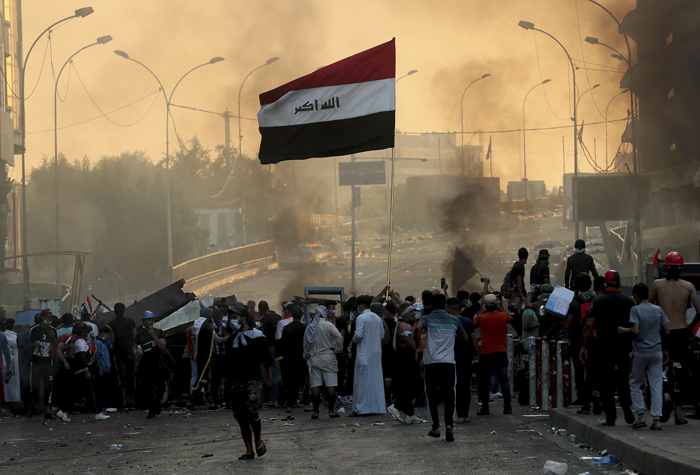
Demonstrators set fire and close streets during ongoing protests in Baghdad, Iraq, on Nov. 9, 2019. Protests erupted in Baghdad and across southern Iraq last month, calling for the overhaul of the political system established after the 2003 US-led invasion. (AP)
In both regions, centrally planned economies had failed to generate the funds required to meet the quality-of-life expectations of the populations.
Finally, the role once played by the Soviet Union in the affairs of its satellite states can be broadly compared to the pervasive influence of Iran in the domestic matters of the countries in its orbit. As the commentator Eyad Abu Shakra wrote recently in Asharq Al-Awsat: “It would be absurd to separate the terrible living conditions in countries like Iraq and Lebanon from their virtual occupation and rule by Iranian-controlled militias.”
Despite the festive feel of some of the protests, the fear of Iran deploying its local proxies to put down the “revolutions” in the two Arab countries lurks constantly in the background. The fact that the protesters in either country have closed ranks on the basis of their shared grievances, rather than their sectarian identities, is seen as an added threat to Iran’s grand strategy.
Looking back at 1989, the Berlin Wall fell without much violence. Within the Soviet Union itself, 21 pro-independence protesters were killed in the republic of Georgia but not elsewhere in the communist bloc. In a break with tradition, Gorbachev courageously decided against using force to quell the revolts. But are Iran’s rulers capable of emulating this noble precedent?
If remarks by Iran’s Supreme Leader Ali Khamenei on the unrest in Lebanon and Iraq are any guide, Tehran will not hesitate to do to the protests there what it did to the Green Movement of 2009, and again to the thousands of Iranians who took part in the 2017-2018 demonstrations prompted by the deteriorating economy.
While few doubt Iran’s ability to inflict pain and punishment on revolutionary idealists, film-makers and intellectuals, it does not have the power to alter the lasting lesson of the fall of the Berlin Wall – which, according to political commentator Anne Applebaum, is that societies that do not reform, die.


